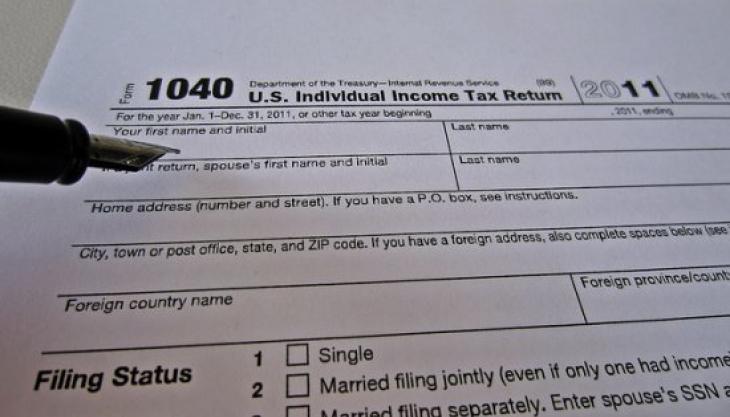Stuck With Income Tax Debt in Greensboro? Bankruptcy Might Be the Answer
Submitted by Rachel R on Wed, 09/27/2017 - 10:20am

Owe back taxes? Greensboro bankruptcy may help
Image Source: Flickr User 401(K) 2012
Owing the IRS is a scary financial proposition for Greensboro consumers struggling with debt. The IRS has impressive powers at their disposal to try and get you to pay up back income taxes. They can garnish your wages without notice. They can place a tax lien on your home or vehicle. They can even try and seize funds in your bank account that you need to pay bills and keep food on the table. If the IRS is coming after you for older tax debts – one escape hatch might be to file bankruptcy to wipe the slate clean. To qualify for tax debt relief, you must meet several circumstances.
Timing Is Everything When It Comes to Tax Debt
With IRS tax debt, the timing of how long you owed the debt is important. It’s also important that you filed your tax return on time or after an approved extension request rather than not filing at all. Even if you can’t afford to pay your income taxes, Greensboro consumers should always file their tax returns. Why? Income taxes, like most other debt in life, has a statute of limitations for debt collection. There’s a set window the IRS has to come after you for the debt, and once that expires, you’re in the clear.
If your tax debt is old enough, filing Chapter 7 bankruptcy can result in the discharge of 100% of that debt. Discharge means it’s erased, gone, and uncollectible. This can be a huge break if you’ve been threatened with a lien or garnishment by the federal government over your income taxes. There are three important dates that reveal whether your tax debt might be dischargeable. One is when the tax return was filed, the next is when the tax was due, and the last is when you file bankruptcy.
Here’s How the Timing Works
#1 Your bankruptcy case must be filed three or more years after the tax return was due. Tax returns are due on April 15 (in most years). For a tax return due April 15, 2014, you would be eligible to seek relief after April 15, 2017.
#2 Also, your bankruptcy case must be filed two or more years after the tax return was filed. If you filed the return on time, then the sample dates in #1 above apply.
However, if you filed an extension, for example, the three-year clock in the case of #1 would start from the date you actually filed the return. So, if you got an extension and filed your return three months later on July 15, 2014, the three-year clock would mark the eligibility date on July 15, 2017 – three years after you filed the return.
Other Conditions Apply to Income Tax Relief
In addition to meeting the date requirements, there are some other caveats and conditions that must be met to be granted income tax relief in Greensboro bankruptcy. If you have pursued other avenues to try and settle your income tax debt, this could make you ineligible for bankruptcy relief. One of these is “OIC” or offer in compromise. This is when you try and cut a deal with the IRS to pay less than you owe, but what you feel you can afford, and they accept the offer.
If you were granted an OIC but then failed to meet the payment terms, that tax debt is ineligible for relief in Chapter 7 bankruptcy. You also cannot receive tax relief in bankruptcy if you tried to cheat the system. If you falsified information on your tax return such as failing to disclose income or lying about deductions, dependents, etc., then you can’t get relief from the debt in Chapter 7 bankruptcy, even if the IRS caught you and you were assessed the correct amount of income taxes.
Finally, if you fail to file your income tax return, the IRS will generally file one on your behalf. This is called a substitute return, and it’s never in your favor. The IRS assesses income taxes in the absence of your filed return by including all of your income and including only the minimum deductions. The tax bill you get from a substitute return is not considered a proper return and your failure to file could cost you the opportunity to see tax relief in bankruptcy.
To find out more about dealing with income tax debt via Chapter 7 bankruptcy, contact the Law Offices of John T. Orcutt. Call +1-833-627-0115 now for a free Greensboro bankruptcy consultation at one of our convenient locations in Raleigh, Durham, Fayetteville, Wilson, Greensboro or Wilmington.
Debts Hurt! Got debt? Need help? Get started below!
Serving All of North Carolina
- Bankruptcy Attorneys Raleigh NC (North)
- Bankruptcy Attorney Fayetteville NC
- Bankruptcy Attorney Durham NC
- Bankruptcy Attorneys Wilson NC
- Bankruptcy Attorneys Greensboro NC
- Bankruptcy Attorneys Southport NC
- Bankruptcy Attorneys Wilmington NC
Bankruptcy Attorneys Raleigh NC (North)
6616 Six Forks Rd #203 Raleigh, NC 27615 North Carolina
Tel: (919) 847-9750

Bankruptcy Attorney Fayetteville NC
2711 Breezewood Ave Fayetteville, NC 28303 North Carolina
Tel: (910) 323-2972

Bankruptcy Attorney Durham NC
1738 Hillandale Rd Suite D Durham, NC 27705 North Carolina
Tel: (919) 286-1695


Bankruptcy Attorneys Greensboro NC
2100 W Cornwallis Dr. STE O Greensboro, NC 27408 North Carolina
Tel: (336) 542-5993

Bankruptcy Attorneys Southport NC
116 N Howe St. Suite A Southport, NC 28461 North Carolina
Tel: (910) 218-8682

Bankruptcy Attorneys Wilmington NC
116 N. Howe Street, Suite A Southport, NC 28461 North Carolina
Tel: (910) 447-2987
